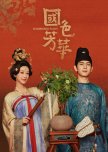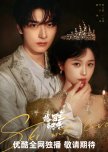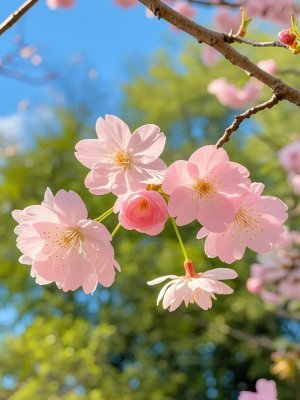
This review may contain spoilers
In the end, it was me who became the prisoner.
FAVE QUOTE: “Even if peace lasts only for a moment, a sincere heart can make its echo endure for generations.” – Ep. 20.To be honest, I wasn’t planning on watching any new releases at the moment, since I wanted to focus on the dramas that had already been on my planning list for a while. Besides, I had never watched any drama starring the leads of this production, nor did I know the plot or the novel. I only knew Liu Yu Ning from his music, but I knew nothing about Song Zu Er, so I truly didn’t know what to expect. However, for some reason, I ended up starting the drama and, without any expectations, I fell in love with it.
The plot tells the story of an old conflict between the Wei and Qiao clans. two families that, in the past, shared a strong alliance. However, this bond was broken when the Qiao clan failed to fulfill a crucial promise: to send soldiers to support the Wei clan in battle. This mistake resulted in the deaths of important members of the Wei family, sparking the rivalry between the two clans. Fourteen years later, hatred and the desire for revenge remained deeply rooted in the hearts and minds of the Wei clan, especially in Wei Shao, who swore to avenge his death relatives by bringing disgrace to the Qiao family. However, fate had other plans, and through an arranged marriage, Wei Shao finds himself tied to Xiao Qiao, a beautiful, intelligent, and strategic woman from the enemy family. As the two live together, the mistrust that once kept them apart begins to give way to love and forgiveness.
The premise of the plot is particularly simple, with few twists, and events that are easy to follow, as it revolves around the love journey of two characters who, at first glance, are enemies with different goals, acting and scheming with caution. Both have their own motivations, but throughout the episodes, they begin to uncover the complexities of their feelings. All of this is set against a backdrop of striving for the well-being of the population, reflected in the mission to build water channels between the States. So, it’s not a heavy story, filled with endless political intrigues or complex, dark plots with multiple subplots and villains. There are no prolonged misunderstandings or overly exhausting tensions. In fact, it’s a much lighter, more humorous, and romantic drama than expected, especially when compared to other dramas with similar themes. With cute moments, it's a story that warms the heart, holding its own beauty: simple, yet enchanting.
The development of the protagonists is interesting due to the contrast between their personalities. Wei Shao is a man shaped by war and adversity, with a cold demeanor that hides a warm heart. Despite a childhood marked by trauma and little affection, he deeply values family. Outwardly, he appears strong, but inside, he carries purity and kindness. On the other hand, Manman grew up in a loving, supportive family environment. Although her image conveys fragility, she is, in truth, a fortress. Her strength doesn’t come from physical weapons or brute force, but from the eloquence of her words and actions. I was positively surprised to discover how warm and genuine Wei Shao was with his feelings despite the hatred he had carried for 14 years, and also to see how wise and understanding Manman was, with a keen sense of perception regarding others.
The highlight of the drama, in my opinion, is exactly the way the romance was built and the chemistry between Wei Shao and Manman. Their relationship was carefully developed over the episodes, and the way their feelings grew gradually and naturally was beautiful, making their connection come alive on screen. Due to their contrasting personalities, each dealt with their emotions differently, facing the complexities of family dilemas. Wei Shao was enchanted by Manman at first sight, but burdened by emotional trauma, filial piety, distrust, and a desire for revenge, he tried to suppress his feelings for a long time. His inner struggle between the pain of the past and the possibility of finding happiness with Manman is particularly compelling, because whether he liked it or not, he was already “bound” to her.
Manman, on the other hand, determined to protect her clan from possible destruction, treats Wei Shao with care and attention, initially out of marital duty. However, as their relationship develops, her feelings for him begin to blossom. She starts off strategic and cautious, but ends up being moved by Wei Shao’s vulnerability and the way he gradually trusts her, turning their relationship into something increasingly deep. The light-heartedness of the more comedic scenes, the moments of tension, and the emotional dialogues made their chemistry magnetic, intense, and tangible.
The casting, for me, was very pleasant, with charismatic characters that brought an interesting dynamic and a good dose of humor and lightness, like the Wei generals, Counselor Gongsun, and the scholar Gao Hen, alongside more intriguing figures like Wei Yan, that while his initial behavior seemed questionable, we gradually come to understand his motivations and vulnerabilities, which added unexpected emotional depth. This development made me realize he was actually a good person, and I came to understand and even sympathize with him as the story progressed.
On the other hand, the villains of the story, Su E Huang and Liu Yan, played roles in the unfolding of political events, with well-defined goals, especially Su E Huang, whose main motivation was to destabilize the relationship between Wei Shao and Manman as a way to weaken the alliance between the Wei and Qiao clans. However, I didn’t find them psychologically complex or strategically brilliant antagonists, as their attempts often failed due to their blind pursuit of power. Perhaps many viewers expected opponents with military power on par with Wei Shao and tactical intelligence equal to Manman, which would have certainly intensified the political aspect of the narrative, and that would have been great, too. Still, I appreciated the approach taken. I believe the choice to portray antagonists this way made complete sense within the style and rhythm proposed by the screenwriter, contributing to a story more focused on interpersonal relationships and emotions, with few political intrigue elements.
As for the pacing, it suited my style. I’d describe it as moderate, balancing the development of the main couple’s romance with a few moments of tension. The drama begins with strong events, has a calmer middle centered on the relationship and family life, and a more frantic ending. Some might have found the middle part slow or expected a faster pace, with more action scenes or intense twists. However, for me, the overall pacing worked well. The more measured flow allowed me to connect with the characters without feeling overwhelmed by constant conflict.
I can’t go without highlighting the performance of the entire cast, which was truly remarkable. Liu Yu Ning and Song Zu Er, as the leads, delivered amazing performances, capturing the essence of their characters with sensitivity and authenticity. Besides them, the supporting actors were also crucial to the production’s success, as each brought their characters to life convincingly.
The visual and sound aspects of the drama were also excellent. The soft makeup, beautiful accessories, and detailed costumes enriched the narrative’s beauty, especially the protagonists. Wei Shao’s dark-toned outfits reinforced his authority and power. Meanwhile, Manman wore light-colored garments—white, blue, and pink—which emphasized her delicacy and subtly reflected her personality. I really liked the opening song (Lone Hero) and the ending song (Blazing Moon). The setting was immersive, and the CGI was well-balanced. The cinematography was spot-on regarding color palette, lighting, and camera movement.
Despite everything mentioned, there are a few aspects I would change:
(1) The way Bi Zhi’s character was developed gave me mixed feelings. Even though he was a good person, his arc seemed to lack initiative. His actions were always driven by others, as if he had no autonomy. It would've been more interesting if he had more personality.
(2) The events leading to the death of Wei Dian, in my view, had little impact on the overall plot and could have been handled more meaningfully. It lacked direct relevance to the story’s progression.
(3) The dramatic tension in the final episodes was frantic, but I felt it could have been better executed and paced. The delivery of the events deserved a more orchestrated and scripted buildup, with more detailed and impactful conflict scenes. I would’ve loved to see more battle scenes showcasing Wei Shao’s combat skills, as well as his generals and Wei Yan. I believe the episode cuts may have compromised the editing and development of these scenes.
(4) Regarding Wei Liang’s death, I don’t think it was necessary. It would have been more satisfying to see him fighting bravely and surviving, albeit injured. His death, like Da Qiao's, felt more like a tool to create dramatic tension. I wish both had had more positive outcomes. Also, I missed having more focus on the main couple at the end. After everything they went through, especially because of the war, they deserved more screen time for a more emotionally complete conclusion.
(5) The deaths of Su E Huang and Liu Yan were portrayed in a mild way considering all the chaos and suffering they caused throughout the story. It would’ve been much more satisfying if they had faced harsher and more proportional consequences for their actions.
Overall, "The Prisoner of Beauty" is a refreshing drama that gave me moments of emotion, laughter, tears, and celebration. The story sensitively builds a romance between two people from rival clans, with performances were well delivered, contributing to a truly captivating narrative.
Was this review helpful to you?

This review may contain spoilers
Visually stunning with strong characters, but reservations on pacing and plot.
SYNOPSIS: Melody of Golden Age, released in 2024, blends romance, mystery, and political intrigue. The story follows Yan Xing, a young woman from the Yan family who works as a scribe in the Ministry of Justice. Gifted with notable investigative talent and a strong sense of justice, she stands out for her deductive skills. Due to an unexpected circumstance, when her sister escapes an arranged marriage by the Empress Dowager, Yan Xing finds herself in a difficult position. To protect her family, she ends up marrying Shen Du, the head of the imperial guard, known as "White Ghost," feared by everyone for his strict approach and intimidating presence. With various mysterious cases arising in the city of Xiang'an and surrounding areas, Yan Xing and Shen Du team up to solve them. As they spend more time together, their bond grows stronger, and they uncover a massive conspiracy within the Imperial Court.FAVORITE QUOTE: “Everyone must love themselves before loving others.” - Ep. 07
POSITIVE POINTS:
(1) Chemistry Between the Protagonists: The interaction between Yan Xing and Shen Du is fascinating, with a noticeable contrast between their personalities in many situations. While Yan Xing is driven by intense determination and some impulsiveness, Shen Du, though equally courageous, is more calculating and prudent in his actions. Their relationship develops gradually, and we can observe the transformation of their feelings, shifting from care to a growing passion as the story progresses. An interesting detail is that they have known each other since childhood due to a traumatic experience Shen Du went through. However, because of his night blindness, he does not remember that Yan Xing is the same girl who visited him during his punishment. As they spend time together, he falls in love with her, not knowing she was the one who helped him in his childhood. This aspect of the story is particularly touching, as, unlike many dramas where the male lead only falls in love when he learns about the shared past with the female lead, here Shen Du's love for Yan Xing had already blossomed in his heart even without him knowing who she truly was. Their interactions, full of glances, declarations, and displays of affection, were truly captivating, their chemistry was incredible.
(2) Acting: The cast did an amazing job. It is undeniable how well all the actors performed their roles, staying true to the personalities and character development outlined in the script. In my opinion, the standout performances were by Ding Yuxi (Shen Du) and Ancy Deng (Yan Xing). Ding Yuxi is an incredibly talented actor, whose performance is solid and intense. His exceptional ability to control his emotions just through facial expressions is remarkable. He perfectly captures the complex layers of his character: a relentless man driven by a deep desire for justice in the name of his family, cold and fearless, yet revealing a protective and affectionate side when it comes to the person he loves. Ancy Deng, despite her youth, brings Yan Xing to life with an admirable performance. She skillfully conveys the inner emotions of her character, whether in moments of action, where her determination shines, or in more delicate moments, where her vulnerability and humanity become evident.
(3) Costumes: The costumes in this drama are stunning and play an important role in building the atmosphere and characterizing the roles, reflecting the historical context. I want to highlight the costumes of the imperial court, which are richly detailed, with colors and ornaments that exude the splendor of nobility and the clear social differentiation. Additionally, Shen Du's costumes, typically in shades of black, were a great choice as they reflect his authority and strength, creating a contrast not only with his nickname "White Ghost" but also with the costumes of the villain, Lai Luo Zhi, who wears lighter-colored attire, creating a striking visual difference between them. Yan Xing's costumes are equally charming. She is seen wearing outfits that balance practicality and femininity, fitting her position and personality, often in shades of blue, green, and pink.
(4) OST: The soundtrack choice was excellent, complementing the scenes beautifully and creating an immersive atmosphere. My favorite song was "Form a Pair" sung by Xu Ziwei. It is so beautiful, with a soft melody and touching lyrics that perfectly capture the romantic essence of the story.
* OBSERVATIONS:
> One of the things I found the funniest was that anyone involved with the Huo'Er Sect, whether directly or indirectly, always let out that evil laugh, hahahahaha. I couldn’t stop laughing at those scenes!
> The protagonist's impulsive personality never annoyed me, is that strange? LOL, I say this because it was one of the things I saw people comment on the most, but it didn’t bother me at all. In my opinion, her behavior and personality flowed well as the episodes went on.
> The kissing scenes between the protagonists were few, and when they did happen, they seemed a bit awkward. This could be a reflection of the direction, considering it's a historical drama, where the age difference between the lead actors may have been taken into account.
POINTS THAT COULD BE IMPROVED:
(1) The Investigative Plot Construction: When I started watching the drama, I thought the cases presented would be isolated. However, as the episodes progress, it becomes clear that all the cases are interconnected by the Huo'Er Sect. While this is an interesting approach, as it creates a complex web where various characters are connected and manipulated by the sect's ambition for power, at times the connection between the mysteries felt forced and even a bit far-fetched. This diminished the authenticity of the investigative aspect of the story.
(2) Abrupt Scene Transitions: At certain moments throughout the 40 episodes, it's noticeable that there's a lack of a more seamless transition between scenes. The sudden shifts from one setting to another or even the interruption of an ongoing scene caused, in me, a disruption in the flow of the narrative at times.
(3) The Separation of the Protagonists and the Construction of the Last Episode: In episodes 36-37, the protagonists separate, along with the signing of the divorce letter, which, in my opinion, was unnecessary for the development of the plot. Given the intelligence and strategic ability of Yan Xing and Shen Du, it would have been more interesting if they had crafted a well-orchestrated plan together to capture and expose Lai Luo Zhi's crimes in the Imperial Court. Instead, the narrative takes a route where Shen Du, in a gesture of protection, hurts Yan Xing by separating from her without revealing his true plan, which creates a sense of discomfort in their relationship. This choice, while understandable from Shen Du’s perspective of wanting to protect Yan Xing, diminishes the impact of their partnership, which was built throughout the story. Therefore, the separation was merely a way to generate dramatic tension, creating an unnecessary sense of disconnection for characters who were already so united and in love. Regarding the final episode, after the exposure of Lai Luo Zhi's crimes and the restoration of order in the Imperial Court, Shen Du chasing after Yan Xing. However, she rejects him, and Shen Du, in an attempt to win her back, sets up a marriage plan. Although the ending brings a romantic conclusion, there is a sense that it could have been better constructed. I would have liked to see a deeper moment between the two, where Shen Du sincerely apologizes and explains his reasons clearly, especially regarding the forced separation and his attempt to protect her without involving her in the dangers of the court. This dialogue could have been a crucial moment for character development, allowing both to express their emotions, fears, and the reasons behind their decisions. Additionally, the marriage could have been presented more emotively.
OVERALL VIEW:
Melody of Golden Age is a visually stunning drama with an intriguing narrative and strong characters, but it falters slightly in its investigative plot construction and pacing. My rating is 8.0/10.
Was this review helpful to you?

This review may contain spoilers
This is truly a dream within a dream! A rollercoaster of emotions
Dramas with transmigration themes always captivate me because they create a fantastical atmosphere that allows exploring impossible worlds in reality. This type of narrative is a true rollercoaster of fun and madness, and I love that immersive feeling. This particular drama brings the story of a young actress who, while reviewing a script entrusted to her for a leading role, ends up transmigrating into the story.The attempt to adapt to this new world and, more specifically, survive the plot is a chaotic adventure, as the original script contained several key scenes focusing on the suffering of her character caused by Nan Heng, the seventh prince of the kingdom, known as the God of Death. At first, he is portrayed as a cold, cruel, and calculating man, someone difficult to approach or live with. However, as the actress spends more time immersed in this fictional universe, it becomes clear that the personalities of the characters are not as fixed as they seemed in the original script.
What she initially believed to be the truth about the characters and the plot begins to deconstruct, revealing layers and complexities she never imagined, as what seemed to be a storyline with rigid rules and limits soon transforms into an arena, where every action can have unpredictable consequences. In this process, the young actress not only challenges what the story dictates for her but also finds herself confronted with her own emotions, choices, and an unexpected twist in the fate of everyone involved.
Although classified as a romantic comedy, I would consider it more of a dramatic comedy. The premise of the script is easy to follow, but it goes beyond the apparent simplicity. The script explores themes such as the perception of destiny and the thin line between "good" and "evil." These issues lead to a series of debates within us, the viewers, about the actions and postures of the characters, especially the protagonists.
Nan Heng and Song Yi Meng have opposing views on destiny. While Nan Heng believes in free will and fights to shape his own future, Song Yi Meng, knowing the original script of the story, feels trapped by destiny and comes to believe that the events described are inevitable, creating an internal conflict between what she thinks she knows and what she truly feels. The relationship between the two questions the possibility of challenging the script’s destiny, while also revealing how fear and insecurity can prevent us from fighting for our choices.
Additionally, the drama proposes a reflection on the duality between good and evil, especially through the characters Nan Heng and Chu Gui Hong. Nan Heng, originally portrayed as cruel and manipulative, was a victim of a hostile environment from childhood, unlike Chu Gui Hong, considered just and kind. However, with Song Yi Meng's transmigration, the characters begin to reveal more complex layers, challenging the simplistic view of what is good or evil. Thus, the plot invites the viewer to consider that a person's essence can be shaped by their experiences and choices, and that moral judgment requires sensitivity and context.
Aesthetically stunning, with an immersive setting, beautiful scenery, detailed, well-crafted costumes, and good cinematography, A Dream Within a Dream stands out not only for its visual beauty but also for the impeccable performance of the cast, the comedic moments, and the engaging soundtrack.
What truly elevated this production is the dynamic between the actors. Their performances were so vivid that it felt like the characters came to life, making me constantly laugh, come up with theories in my mind, or reflect and debate their choices and actions. This shows the great timing of the cast, both for comedic moments and for conveying the anguish of their characters.
Liu Yu Ning and Li Yi Tong were simply brilliant, their expressions and acting skills were excellent. The actors who played the Emperor and Chu Gui Hong delivered such convincing performances that they really made me hate them (laughs). The Nightwalkers were simply wonderful and delivered many incredible scenes — I loved both the camaraderie and loyalty they demonstrated — and the rest of the cast stood out with exceptional performances.
Moreover, although A Dream Within a Dream has 40 episodes, the story remained engaging for me. Perhaps the fact that I watched it during its airing, eagerly awaiting the next episodes, helped keep that feeling. In any case, the drama unfolds in such a fluid manner that I never felt bored at any point.
Despite all that has been said, there are a few things I would change or add. For example, the ending could have been more explicit in showing that everything was just a script within a script. Additionally, transmigration dramas, in general, tend to not delve deeply into the transition to the modern world, but I really would have liked to see more of the return to the modern world.
Another point would be the relationship between the protagonists. Although their chemistry is great, it would have been interesting if the misunderstandings (I admit, they're quite agonizing haha') had been resolved a little earlier, allowing the romantic development to be more explored. Also, I would have liked to see Song Yi Meng acting more strategically regarding the script, rather than accepting it passively as an absolute truth for much of the plot.
Thankfully, in the last episodes, she finally decides to fight against this fatalistic stance, joining forces to change her destiny. However, I acknowledge that this initial attitude was an intentional choice, aiming to provoke reflections on destiny, insecurity, fear, and survival.
Overall, A Dream Within a Dream mixes elements of fantasy and comedy, with a great dynamic among the cast, excellent cinematography, and a wonderful OST. If you're thinking of watching a dramatic comedy, perhaps this drama might be a good choice.
Was this review helpful to you?

This review may contain spoilers
EXCELLENT! Highly recommended.
Reset, a drama that premiered in 2022, tells the intriguing story of two young individuals, Li Shi Qing and Xiao He Yun, who find themselves trapped in a time loop amidst a chaotic scenario. They desperately try, in many frustrating ways, to save all the passengers of Bus 45 from an inevitable and imminent explosion. In just 15 episodes, each around 40 minutes long, the show presents a compelling race against time without ever becoming monotonous. It's thrilling from start to finish, as each episode deepens our understanding of the dynamics inside that bus. Initially, the explosion is believed to be caused by a collision between the bus and a fuel truck, but as the loops repeat, the situation becomes more complex. What seemed like an accident gradually turns into a planned crime, raising new questions: who is behind the explosion? What is their motivation? These questions drive the protagonists to investigate, observe the passengers, and gather information from the local police in a frantic attempt to break the loop and prevent the tragedy.POSITIVE PONTS:
1. The time loop concept is one of the most fascinating and engaging aspects of the plot. What’s particularly interesting is that the loop restarts every time the protagonists die, fall asleep, or when the clock strikes midnight. This creates a constant tension, with the characters in a literal race against time, trying to prevent the catastrophe with every new cycle. This device creates a sense of urgency that keeps us hooked, as with each repetition, more clues and details about the bus's situation and the surrounding events are revealed.
2. The evolution of the relationship between Li Shi Qing and Xiao He Yun is one of the central and best-developed elements of the series. Their bond grows naturally and touchingly as they face extreme stress and tension together. How they deal with feelings such as fear, frustration, sadness, and even physical and emotional exhaustion is portrayed realistically, adding depth to their characters. Even in a supernatural context, the way they respond to adversity makes them relatable to the audience, making the story emotionally captivating.
3. The interaction between the protagonists and the local police also stands out as a crucial part of the narrative. The interrogation scenes are intense, conveying the characters' anguish as they try to uncover the truth before the loop restarts. This dynamic creates an atmosphere of urgency, constantly testing the line between distrust and collaboration.
4. The dynamic inside the bus is another highlight. The show brilliantly explores how small changes in the protagonists' actions can lead to different reactions from the passengers. This not only helps us understand the personalities and internal conflicts of each secondary character but also encourages reflection on how our choices, no matter how small, can impact those around us.
5. The performances were excellent. The actors conveyed their emotions convincingly and realistically, without exaggeration, and the script was well-crafted and structured, ensuring that all the events necessary for a comprehensive understanding of the drama were included.
OVERALL VIEW:
Reset stands out for its intelligent and well-executed plot, earning a 10/10 rating. Highly recommended.
Was this review helpful to you?

This review may contain spoilers
The essence of truly loving someone.
The First Frost is a 2025 Chinese drama that tells the story of love and overcoming challenges between Wen Yifan and Sang Yan. Six years after graduation, Wen Yifan encounters Sang Yan, her former high school friend, in a bar. Initially, they pretend not to recognize each other, but fate leads them to become roommates under unexpected circumstances. Throughout the series, the drama explores not only the rekindling of an interrupted love but also deep issues such as sexual harassment, emotional healing, and the process of forgiveness. Together, they face challenges, discovering that true overcoming comes from learning to deal with the wounds of the past and moving forward. The series offers an intense reflection on how love can be a source of strength and healing, even in life's darkest moments.POSITIVES:
1. Chemistry between the protagonists: The interaction between Wen Yifan and Sang Yan is the biggest highlight of the series. The way actors Bai Jingting and Zhang Ruonan portrayed their characters was simply incredible, creating a strong emotional connection. The bond between them was so genuine and exuded so much authenticity, especially through subtle glances and gestures. Filled with intense emotions, the drama went beyond a simple romance, showing us, as the plot progresses, the evolution of their chemistry, from unresolved tension to a mature relationship built on mutual support. This network of support and love that Yifan received from Sang Yan was vital for her emotional healing, adding a new dimension to their connection.
2. Addressing complex themes: The series sensitively tackles themes such as sexual harassment, loss, and overcoming difficulties. Wen Yifan deals with these experiences, and the narrative shows how this trauma affected her personal and professional life. The harassment she faces makes her question her own reactions and the impact it has on her self-esteem and relationships with others. The series not only illustrates the act of harassment but also focuses on its psychological consequences, such as fear, stress, shame, loss of trust, and challenges in establishing healthy relationships. By addressing these issues, the series conveys an important message about the need to approach these matters with empathy and care.
3. Cinematography and soundtrack (OST): The cinematography of the series was of high quality, with the use of a color palette and filters that complemented the emotional tone of the story. The winter atmosphere and seasonal changes are also used symbolically, reflecting the cycle of the characters' lives. Additionally, the soundtrack complemented the cinematography, with several tracks of a melancholic and introspective tone, reflecting the central theme of the series: overcoming trauma and the healing process.
4. Time anchoring: Throughout the narrative, the drama used an interesting technique of showing the timeline of significant events. This stylistic choice played an important role in how the plot was presented. I found this tool useful, as it added a touch of realism to the story, allowing us to observe the process of their lives since high school.
AREAS I WOULD ADJUST:
The script was well-structured, aligning with the initial plot proposal. However, some aspects could, in my opinion, be adjusted:
1. Development of the secondary couple: Although this couple's arc was not entirely unsatisfactory, I feel there was room for a more interesting story for them. It's not that I disapproved of what was presented, but I believe that, with a more creative approach, their partnership could have been explored in a deeper and more engaging way, as they had good chemistry.
2. Dance scenes: I don't think the dance scenes were bad, but I believe they could have been executed better to deepen the immersion in the scenes. While dance has the power to convey intense emotions and reflect the relevance of this activity in Yifan's life, at times, the movements performed by the actress didn’t seem to fully explore the potential that the character appeared to have, especially since she had been practicing ballet since childhood.
3. Yifan's disappearance: I understand that Yifan’s six-month disappearance represented an important period of emotional and physical distancing for the character. During this time, she withdrew from her relationships and daily life, using the time to reflect on her personal traumas and challenges, intending to protect those she loved. This six-month interval was a time of isolation and self-discovery, allowing her to return stronger and more determined. However, in my opinion, I think this plot could have been left aside, as Yifan did not explain her absence to anyone, causing suffering to Sang Yan, who was left wondering what happened or where she was.
OVERALL VIEW:
The First Frost is an engaging and intense series that presents a more mature romance and addresses deep themes. The performances were excellent, and the plot has a significant emotional impact. My rating is 9.5/10.
Was this review helpful to you?

This review may contain spoilers
An Equivalent Exchange: I received a captivating drama and return it with a perfect score.
Guardians of the Dafeng was a surprisingly charming discovery for me. I had always known of its existence, after all, it was a much-talked-about and popular drama, but I didn’t know anything about the plot or the novel that inspired it. When it was released, I didn’t even consider watching it because I was focused on other productions. However, earlier this month, I decided to give it a chance... And I’m so glad I did!With a captivating blend of fantasy, humor, and mystery, we are transported into the journey of Yang Ling, a charismatic young man who graduated from the police academy, and, through twists of fate, ends up starting his career in real estate. Everything seemed to be going as planned until, after a seemingly ordinary game with his colleagues, his life takes an unexpected turn: Yang Ling awakens as Xu Qi An in Dafeng, a kingdom filled with hidden forces and supernatural events.
Armed with his modern knowledge and keen investigative deductive abilities, Xu Qi An quickly stands out, attracting the attention of powerful institutions in Dafeng. Initially, he seeks only a peaceful, financially comfortable life, but his strong sense of justice drives him to face the abuses and injustices he witnesses. What he didn’t expect was that all of this was part of a complex scheme, in which he had been carefully manipulated as a key piece in a much larger game.
For me, the strongest point of this drama lies in the development of its characters and the relationships formed throughout the story. Each bond, every interpersonal dynamic is developed so naturally that it was impossible not to get involved. On top of that, the cast delivers incredibly convincing performances. Dylan Wang truly stood out as Xu Qi An, with his portrayal being so immersive that at times, it felt like we were watching Dylan live that reality, rather than just playing a character.
Charismatic, silly, intelligent, impulsive, and kind, Xu Qi An won me over with his essence. One line that I think perfectly illustrates his character is: "It's not about worth. Some things in life are greater than life itself." This line reflects the depth of his worldview because, despite being human and flawed, he carries a high sense of justice. He understands that there are values, principles, and relationships that cannot be measured by individual worth, and that, above all, there are aspects of life that are greater than existence itself, such as justice, loyalty, and truth. Xu Qi An knows that what really matters is acting with integrity, even if it means making personal sacrifices.
His interactions with the other characters were captivating, especially with his chaotic and eccentric family. These scenes were among my favorites because they combined humor and affection. Despite being clearly dysfunctional haha, there was genuine warmth between them. Moreover, his relationship with the Guardians’ team was also full of comedic moments. His friendship with some of the group members, especially Guang Xiao and Ting Feng, was incredible, as they shared the same charming energy, almost like partners in mischief, haha.
Another touching highlight was his connection with Lord Wei. There was a relationship filled with affection and respect, almost like father and son. It was moving to see the mutual care between them, something that stood out because of the sincerity and emotional depth in the dialogues they had throughout the episodes. Xu Qi An’s interactions with the Astronomical Department and the Yu Lun Academy also added a dose of humor to the plot. The “equivalent exchange” dynamic, where he would always ask for something but it would always come with some kind of demand in return, created hilarious scenes.
And of course, I can’t forget to mention his relationship with Princess Li An, which brought the sweet and romantic moments to the drama. Notably, romance isn’t the main focus of this drama, but I enjoyed what was portrayed, as the two had personalities with some similar traits, which made their scenes together ridiculously cute. I understand that not everyone may have sympathized with the princess’s personality, but personally, I wasn’t bothered by it. I saw in her a young woman still searching for true purpose, someone who, despite being spoiled, was genuine, loyal, and sincere in her feelings, which made me grow fond of her character over the episodes.
The plot of this drama isn’t complicated, but it’s important to pay attention to the political and social events throughout the episodes. At first, it may seem like the challenges Xu Qi An faces are disconnected, but in reality, everything is intertwined by a power game, involving several characters who build this complex network of relationships. The production maintains an engaging pace, with well-crafted and immersive sets and CGI. The costumes and soundtrack added a memorable visual and auditory touch. Additionally, the cinematography stands out, especially in the fight scenes, which were executed impressively. Honestly, I wish there had been more of these scenes, haha.
With 40 episodes, the drama managed to answer all my questions, both directly and indirectly. While many might find the ending rushed or lacking a clear conclusion, I thought the approach was quite interesting because it left a compelling mystery, sparking my curiosity about how the characters will handle the cliffhanger left in the final episode. That cliffhanger promises to add new layers to the plot. Now, I can only hope for a new season.
If you’re looking for an adventure drama with hilarious comedy driven by the characters’ actions and a touch of fantasy, this might be a good recommendation for you. Guardians of the Dafeng won me over with its lightness, even when dealing with chaotic situations, the genuine love and care the characters have for Xu Qi An, and the way, despite his imperfections, Xu Qi An becomes a symbol of the fight against the injustices in the kingdom.
"You can easily oppress the commom people, but you can't fool the heavens." — Xu Qi An.
Was this review helpful to you?

This review may contain spoilers
Peony that Blooms Against the Wind <3
"Flourished Peony" is a Chinese historical drama that tells the story of He Wei Fang (also known as Mu Dan), a young woman who is the daughter of a merchant. Due to her mother's severe illness, she is forced to marry Liu Chang in exchange for the promise that his family would provide the necessary medicine to cure her mother. However, her mother’s health does not improve and she passes away. Despite this, Mu Dan honors her part of the agreement, but the marriage becomes a significant source of suffering for her. Her in-laws treat her coldly and take advantage of her dowry, while her husband never shows any interest in getting to know her or forming a genuine connection. The situation takes a turn when Mu Dan discovers that the medicine provided by her in-laws was counterfeit. Determined to change her life, she decides to seek a divorce. During this process, she meets Jiang Chang Yang, the Floral Envoy, an official who, although he appears corrupt, is, in fact, a kind-hearted and altruistic strategist devoted to the well-being of his country, and he helps her get the divorce. Afterward, Mu Dan fakes her death and starts a new life in the city of Chang, where she forms an alliance with Jiang Chang Yang, developing a profitable business based on the cultivation of peonies, a flower known for its beauty and value. In the city, He Wei Fang faces new challenges and dangers, but with her determination and resilience, she manages to rebuild her life and help other women who, like her, have faced difficult circumstances.POSITIVE POINTS:
Actually, in my opinion, this drama has no flaws, but I would like to emphasize some positive aspects about it.
1. SCRIPT: The script is undoubtedly one of its greatest strengths. It is well-written, with careful attention to detail. The richness in the dialogues and the development of each character are evident, making them convincing and believable. The story focuses on He Wei Fang's struggle for independence, freedom, and personal achievement, blending elements of overcoming adversity and resilience. In addition to He Wei Fang, characters such as Sheng Yi, Jiang Chang Yang, and Liu Chang are also carefully developed, gaining layers that add complexity to the narrative. This allows for the exploration of deep themes such as power, justice, relationships, morality, and female empowerment in a unique way.
2. HISTORICAL CONTEXT, SETTING, AND COSTUMES: Set in the Tang Dynasty, the drama provides an immersive experience, with meticulously crafted sets and costumes that create a rich atmosphere and enhance the narrative. It is incredibly captivating, transporting the viewer to an era of great beauty and complexity, where every visual detail contributes to the development of the story.
3. ACTING: The actors delivered intense and emotional performances that add depth to each character. The performances were masterfully executed, with impressive naturalness. The protagonist, He Wei Fang, is portrayed with great sensitivity, capturing her internal struggle for independence and personal growth, subtly conveying both the pain and strength of her character. In addition to her, Jiang Chang Yang is brilliantly portrayed, showcasing the duality and complexity of his character. Liu Chang also stands out as an intense character, displaying the nuances of a man who initially presents himself as someone determined to succeed on his own merits, with principles and values, but who undergoes a moral transformation due to external pressures.
The only thing that bothers me is that they split the story into two parts (hahaha). I'm eager to find out how the plot will unfold, what challenges the protagonists will face, how the romance will develop, and what will happen with the supporting characters. Now, all that's left is to wait!
OVERALL VIEW:
Flourished Peony is truly surprising, with a carefully developed theme and exceptional execution in every aspect. The production is top-notch, featuring rich settings, impressive scenery, and stunning cinematography. My rating is 10/10, without a doubt!
Was this review helpful to you?

This review may contain spoilers
OK! Much untapped potential
The drama Ski Into Love, released in 2025, addresses the professional challenges and the development of the relationship between Wei Zhi and Shan Chong. The plot follows Zhi, a talented cartoonist whose career is affected by a scandal related to the use of AI. In light of the controversy, she decides to start over by creating a new comic book story about snowboarding. In search of inspiration, Zhi goes to the Beishan Ski Resort, where she meets Shan Chong, a former professional snowboarder. Motivated by Zhi’s positivity, he decides to return to competitions. Together, they face and overcome their personal issues, offering each other support and love throughout this journey.With impressive scenery that adds an aesthetic feel to the narrative, along with snowboarding scenes that enhance the atmosphere, the drama successfully creates greater immersion and dynamics. However, the theme is, for the most part, familiar, with a script that addresses starting over and romance in a clear, yet predictable way, without bringing many innovative elements that could have created a greater impact or emotional depth. Perhaps the reduction in the number of episodes affected the fluency and authenticity of the script, slightly compromising the deeper development of the plot.
In terms of acting, in my opinion, everyone performed well according to the personality proposed for each character. Clearly, the protagonist’s personality is controversial, tending to be more infantilized, especially in her emotional reactions and speech, which contrasts with the rest of the cast. However, even though her actions were excessively cute, she appeared to be understanding, kind, and not impulsive. This infantilization may have been a creative choice by the writers, aiming to convey a more naive approach to resolving life’s problems. The thing is I have a preference for more mature characters and, personally, would have liked Wei Zhi to be less infantilized.
The chemistry between the protagonists was, overall, good, and their interactions were cute, but in my view, they didn't become memorable. One point that bothered me was that Wei Zhi continued calling Chong "master," even though they were already in a relationship, which gave me the impression of a distance in their connection. There was great potential to explore their relationship more deeply. On the other hand, interactions with secondary characters were interesting and complemented the main couple’s story well. I was particularly enchanted by the relationship between Dai Duo and Shan Shan. I found their dynamic as a couple very sweet and genuine, and I wish their story had been more explored, adding more layers to their relationship. They could have been the second main couple, instead of Lao Yan and Jiang Nan Feng, whose romance, in my opinion, had a problematic start and an unconvincing development.
Overall, the drama Ski Into Love blends the elements of a light romance with a snowboarding backdrop. Even with its positive points, such as a pleasant OST, visually immersive cinematography, good chemistry between the protagonists, and interesting interactions among the cast, I feel it had great potential to be something even more impactful. The premise of the story, with its journey of overcoming, was promising, but in my opinion, the production and the writers didn’t manage to fully explore the plot’s possibilities, leaving me with the feeling that something was missing. My rating is 7.5/10.
Was this review helpful to you?

This review may contain spoilers
A short drama, but well-structured and cute.
Reset Life is a drama released in 2019 that tells the story of Yun Xiao Xi, a young woman with a promising future in the fashion world. While still a university student, she was unfairly accused of plagiarism during a fashion competition, an act committed by Xia Duo. To make matters worse, on the same day of the accusation, she loses her mother in a hit-and-run accident, which deeply devastates her. This series of events marks the beginning of a life filled with hardships, where Yun Xiao Xi becomes undervalued both professionally and personally. After five years, she is once again ridiculed by Xia Duo and some former classmates. Feeling increasingly hopeless, Yun Xiao Xi begins to question her life and the paths she has taken. In a moment of deep sadness and regret, she receives a mysterious "pill of regret," which gives her the chance to travel back in time. With this new opportunity, she decides to change her attitude, face her fears, and alter the course of her life and career.POSITIVES POINTS:
1. Plot: Considering that this drama only has five episodes, the plot is well-structured, cohesive, and objective. The narrative is straightforward, without unnecessary subplots, focusing on what really matters: the protagonist Yun Xiao Xi’s journey toward her fresh start. Thus, the initial premise of the drama is fulfilled, maintaining fluidity between the episodes and a good pace.
2. Time Travel Theme: Although the time travel theme is not something new, as there are many dramas with similar plots, it is something I personally enjoy because it brings a sense of possibility and hope. Additionally, it provides an excellent opportunity to explore how our actions and decisions can shape our future. Each drama that adopts this theme finds a unique way to present time travel and the reason behind it. In this case, time travel occurs through a "pill of regret," created by a man in gratitude for the kindness shown to him by the protagonist's mother. Thus, Xiao Xi has the chance to change not only her own fate but also the fate of others around her. Although I find the man who created the pill somewhat caricatured, I appreciated that, even briefly, the drama explains his motivation for creating the pill and how it came to be.
3. Acting: Notably, the performances play a significant role in immersing the audience in the story. Actress Li Ying Ying's (Yun Xiao Xi) conveyed the sweetness and sorrow that her character felt due to the accusations and the loss of her mother. What stood out most in her performance was how her eyes always expressed the love she had for her mother and the fear of losing her again. Actress Jiang Zi Chen (Xiao Duo) also did a wonderful job portraying her character, who is spoiled, selfish, and jealous. She skillfully explored the layers of arrogance, insecurity, and competitiveness, making it convincing. Ding Yu Xi (Cai Tian Mu) is another highlight, especially due to his incredible ability to express emotions through his eyes. His performance is deeply immersive, striking a balance between the gentleness and delicacy of his character. What impressed me the most was how he brought such an enchanting and endearing personality to Cai Tian Mu, making him absolutely lovable.
4. Development of the Female Protagonist: I appreciated the development of Yun Xiao Xi throughout the drama. She undergoes notable personal growth, transforming from an wronged, defeated, shy, and sad young woman into a strong, confident person capable of facing not only those who hurt her but also her internal fears.
POINTS I WOULD ADJUST:
Although the drama has an interesting premise, I would have liked the character of the creator of the pill to be more developed. Specifically, I would adjust the creation of the pill to make it more intriguing, making him less of a caricature. Another point is that, while the drama does not focus on exploring the dimension of time travel, such as the consequences and side effects, since the pill is the main resource for time travel, I would have liked the drama to explore more of its ramifications. Additionally, the romance between Xiao Xi and Tian Mu is so charming that I would have liked to see more romantic interactions between them.
OVERALL VIEW:
Reset Life is a drama I had never heard anyone mention, perhaps because it is an older drama or has only a few episodes. Even though it is predictable, it was a wonderful surprise to follow this story. The development of the characters, the protagonist's love for her mother, Cai Tian Mu's protection and kindness, and the exploration of how our actions can shape the future were all captivating. My rating is 9/10.
"Life has no pill of regret. The time that has passed cannot come back. Valuing the present is the true path to happiness." – Reset Life.
Was this review helpful to you?

This review may contain spoilers
Unmissable: when living is the best revenge against your enemies.
The Double, a historical drama from 2024, explores themes such as revenge, justice, corruption, and loyalty. The story follows Xue Fang Fei, who is betrayed and buried alive by her own husband, Shen Yu Rong, after being falsely accused of adultery. Against all odds, she survives and assumes the identity of Jiang Li, the Prime Minister’s daughter, who had died after being tortured in the Zhennu Hall. Determined to seek revenge not only on those who destroyed her life but also on those who harmed Jiang Li, Fang Fei returns to the capital. There, she finds herself immersed in a complex power struggle where political rivalries and family affairs intertwine in an intriguing way. With the support of Duke Su and loyal friends she meets along the way, she overcomes numerous obstacles and draws closer to her long-awaited revenge.One of my favorite quotes from the drama appears in the very first episode: “As long as you're alive, there's always a second chance.” This idea drives the entire journey of the protagonist. The performances of the cast were one of the series’ greatest strengths. Wu Jin Yan, as Xue Fang Fei, was especially remarkable in portraying the transformation from a vulnerable woman to a determined figure driven by strength and a sense of justice. Wang Xing Yue, as Duke Su, played a character of integrity, strategy, and calmness, whose emotional depth is revealed through restrained glances and elegant posture. Joe Chen shone as Ji Shu Ran, a cold and manipulative woman who, under a virtuous facade, deceives and destroys with subtlety. Liang Yong Qi portrayed Shen Yu Rong with a calmness that contrasted with his cruel actions, and his character’s development was coherent and disturbing. Li Meng gave an intense performance as Princess Wan Ning, masterfully portraying the instability and obsession of a villain on the verge of collapse.
The plot is well-structured and coherent, with multiple story arcs converging around the central themes of revenge and justice. The chess game metaphor presented in the drama’s opening is particularly effective in illustrating the dynamics of power and strategy that permeate the entire narrative. Fang Fei is not only confronting her personal enemies but also stepping into a broader political board where silent alliances and betrayals shape the fate of society.
The identity switch between Jiang Li and Fang Fei is one of the pillars of the plot. This narrative decision is crucial in allowing the protagonist to return to the capital and infiltrate the elite. Although the age difference between the actresses might have posed a challenge, especially in convincing the audience of the identity switch, I believe the casting choice suited the drama’s intent. Jiang Li represents youth and fragility, while Fang Fei embodies maturity and strength. By assuming this new identity, Fang Fei is entirely transformed, adopting a new demeanor and revealing how much her suffering has shaped her character. Thus, the story builds a calculated revenge, grounded in precise alliances and strategies.
The romance unfolds in a slow-burn style, with patience and delicacy, developing gradually through glances, gestures, and subtle flirting, without ever overshadowing the main plot. A fast-paced romance wouldn’t have made sense, given that Fang Fei, deeply scarred by betrayal, wouldn't be emotionally ready to give her heart away so soon, and Duke Su, being a strategic and reserved man, wouldn’t easily allow himself to be carried away by emotion. Their relationship blossoms gradually through adversity, grounded in mutual respect, trust, and support. While I would have liked to see more moments between them, the romance was coherent and emotionally satisfying. The chemistry between the couple is evident, and the tension is present from the very first episodes. Despite the actors’ age difference, their characters naturally fit together, as they share intelligence, strategic thinking, and a strong commitment to justice.
Friendships are another highlight of the series, serving as emotional relief in such a heavy narrative. Unlike other dramas where supporting characters are excessively cruel, The Double features genuinely good characters who offer true support to the protagonists. The friendship between Duke Su and the Emperor, as well as the bonds between Fang Fei and Tong, Jiang Jing Rui, Liu Xu, Ye Shi Jie, and the Ye family, bring lightness to the story, showing that there is still room for loyalty and compassion even in dark times.
The development of the antagonists is also noteworthy. The drama prompts deep reflection on how far a person is willing to go in pursuit of status and power. Characters like Ji Shu Ran, Wan Ning, Shen Yu Rong, and King Cheng each resort to despicable actions to achieve their goals. Their development is impressive, revealing that all of them have complicated pasts. While their backgrounds help explain their descent into cruelty, they do not justify their evil actions. Some of them tried to blame others, claiming they were forced to act as they did, but did they truly have no other choice? The truth is, manipulated or not, each one had the power to choose and could have taken a different path.
The visual aspects of the series also deserve praise. The costumes are sophisticated and visually striking, especially the red garments worn by Fang Fei and Xiao Heng, which were stunning and symbolized not only beauty but also power, courage, and passion. The soft makeup, particularly the pearl embellishments on the face, gently complemented the characters’ aesthetics. The settings were immersive: the Imperial Court conveyed grandeur, while the homes and gardens of high-ranking officials reflected their status. In contrast, the simpler dwellings realistically portrayed the social disparities of the time. One standout setting was the Zhennu Hall, with its dark and cold aesthetics that evoked a sense of oppression and suffering. The outdoor scenes showcasing nature were also breathtaking, enhancing the drama’s beauty.
The OST is another charming element, one of the most beautiful I’ve heard recently. Usually, I don’t enjoy every track in a drama’s soundtrack, but in The Double, I liked them all. With 9 tracks, the soundtrack flawlessly complements the series’ atmosphere, featuring gentle, introspective, and melancholic compositions that perfectly capture the emotional tone. Typically, I watch a drama’s opening and ending only once, but with The Double, I rarely skipped them because I loved listening to them.
Despite so many strengths, there are aspects I would adjust. One of them is the punishment of Ji Shu Ran. She was an extremely cruel character, responsible for the death of Jiang Li’s mother, falsely accusing Jiang Li of her son's death, making her suffer in the Zhennu Hall, murdering a concubine’s daughter, and repeatedly trying to defame Xue Fang Fei (in disguise as Jiang Li) after her return. Considering all the pain she caused, her punishment (madness) seemed insufficient. The gravity of her crimes deserved a harsher consequence. Additionally, I felt the deaths of characters like Tong and Duke Su’s companions, while impactful, were unnecessary and didn’t significantly contribute to the plot’s development. I would have preferred for these characters to have had more positive outcomes, without further sacrifices. As for the cinematography, it was excellent, with good camera movement, color palette, and lighting. However, in my view, the number of close-ups was occasionally excessive. While not a major issue, a more moderate use would have worked better.
The ending of the series also left me with mixed feelings. After the victory against King Cheng, the wedding between Duke Su and Fang Fei, supposed to be a joyful moment, is interrupted by a questionable mission, where Duke Su leaves to calm unrest in nearby regions after the King Cheng death. It felt forced, as if added just to create more dramatic tension, ultimately leading to the death of two of Duke Su’s companions. The final scene, if not for the special episode, could easily be interpreted as Duke Su’s death, since it closely mirrors a similar dream Fang Fei had in the first episode. As for the special episode, although I found it sweet, it doesn’t connect well with the ending of episode 40. I would have preferred it to begin with Duke Su returning and reuniting with Fang Fei, followed by scenes of their married life, which would have brought more cohesion to the narrative.
Overall, The Double is an engaging, well-produced drama with outstanding performances. Despite a few details that could have been improved, the work delivers a solid, emotionally resonant, and strategically constructed narrative. My final rating is 9.5/10.
Was this review helpful to you?

This review may contain spoilers
Truly, love is the best thing <3
The Best Thing is a 2025 chinese romantic drama starring Linghe and Ruohan. The plot follows Shen Xi Fan, a hotel manager who suffers from insomnia due to the stresses caused by her seven-year relationship, which is on the brink of ending. In search of relief for her symptoms, she turns to He Su Ye, a doctor specializing in Traditional Chinese Medicine (TCM). Initially, their relationship is strictly professional, with He Su Ye treating Shen Xi Fan's problems. However, as they discover they are neighbors, a deeper connection begins to form. Over time, what starts as a patient-doctor relationship transforms into something more intimate, leading to a light, love-filled, and trusting romance.POSITIVE POINTS:
1. Approach to Traditional Chinese Medicine (TCM): The introduction of TCM into the plot was an enriching, interesting, and educational aspect. This is undoubtedly the drama's standout feature, as it offers an alternative approach to healing and symptom relief. In each episode, we are introduced to a new herb or medicinal plant, with explanations about its health benefits and how it can be used to treat various conditions.
2. Cinematography, Photography, and OST: The cinematography and photography are undoubtedly some of the most beautiful I’ve had the pleasure of experiencing in recent times. It was a deeply immersive, comforting, and sensory experience. The production not only captured the aesthetic beauty of the story but also used visual symbolism to reinforce central themes of the series, such as TCM and the development of the relationship. Additionally, the OST is enchanting, with soft music accompanying the cute, romantic, and introspective moments of the plot, creating a sense of comfort and serenity.
3. Chemistry Between the Protagonists and Interaction with the Supporting Cast: The development of the romance was beautiful, showing the gradual and genuine growth of intimacy between the two, which strengthened over time. What stands out is how they not only fall in love but also support each other's dreams, demonstrating what a solid foundation in a relationship truly looks like. Furthermore, the way they help each other overcome personal and emotional challenges makes their connection even more beautiful. Another positive aspect is how the supporting characters were introduced. There were no major twists or dramatic conflicts, but each character's interaction contributed significantly to the couple's story, providing moments of lightness, humor, and reflection. These interactions helped enrich the narrative, offering balance to the different moments of the plot.
4. Story Development: The plot was well-constructed, respecting the initial premise of the drama, with a gradual, slow, and calm pace that allows us to absorb the evolution of the relationship between Xi Fan and Su Ye naturally. As mentioned before, there were no forced dramatic moments, which, in my opinion, helped maintain the authenticity of the story. Rather than resorting to exaggerated conflicts, the script focuses on the intimate development of the characters, allowing their feelings to grow slowly. This more subtle approach made their romance even more captivating for me.
OVERALL:
"The Best Thing" is an extremely rich visual experience, featuring a healthy, sweet, and calm romance, with Traditional Chinese Medicine as the backdrop of the plot. This combination of serene romance and themes of healing provides a unique and culturally enriching narrative. My rating is 9.5/10.
Was this review helpful to you?

This review may contain spoilers
A story with charming romance, but with a potential that was not fully explored.
> SYNOPSIS: Mr. Bad is a romantic comedy with a touch of fantasy that tells the story of Nan Xing, a young writer who created an online novel with the protagonist Lu Zi Chen, inspired by her idol, and the antagonist Xiao Wu Di, a cunning and manipulative martial arts master. Although Nan Xing writes online stories, her biggest dream at that moment was to work at X-Culture as Lu Zi Chen’s assistant. After a job interview, she makes a wish at a fountain for an "unforgettable love'. To her surprise, Xiao Wu Di, the arrogant villain she created, appears in the real world. What starts as a chaotic situation turns into an unexpected cohabitation. As Xiao Wu Di adjusts to human life, Nan Xing begins to realize that her villain isn’t as bad as she once thought and love starts to blossom between them.> POSITIVE POINTS:
1. Chemistry between the leads: The real charm of Mr. Bad, in my opinion, lies in the relationship between Nan Xing (Shen Yue) and Xiao Wu Di (Chen Zhe Yuan). The two built a chemistry full of charisma, warmth, and sweetness. Their romance isn’t rushed, it develops gradually and naturally. It’s not an intense or fiery chemistry, but rather a balanced mix of tension, humor, and affection. Shen Yue brought all the cuteness and naivety her character needed, while Chen Zhe Yuan impressed with his transformation from a self-centered, egotistical character into someone protective and deeply in love. Their playful banter, subtle glances, and light-hearted moments helped shape a fun dynamic for the story.
2. Mother-daughter relationship: The relationship between Nan Xing and her mother, An Ni Na, was a refreshing element in the drama. Their bond was healthy, filled with mutual support, respect, and genuine affection (something not always common in dramas where family conflicts often take center stage). As the episodes unfold, we discover that An Ni Na isn’t Nan Xing’s biological mother, and that their shared past involves a deep trauma, still, their connection is strong. They live together in harmony, building a relationship based on love and trust, not blood. It’s a beautiful portrayal of family, free from excessive drama and full of gentle, sincere love.
3. Comforting plot: Despite the fantastical element of a fictional villain coming to life, the drama chooses a soft and sweet tone. The conflicts are light, with no major twists, and the episodes are filled with everyday moments that bring a sense of comfort. It’s the kind of drama that doesn’t demand much from the viewer, as there are no intense or dramatic tensions.
> CONTRAPOINTS:
1. Underdeveloped second couple: One of the more noticeable flaws in Mr. Bad is how the secondary characters, especially Lu Zi Chen and Ye Qing, are handled. As the second couple, their dynamic just didn’t click for me. Even though they had a decent amount of screen time and their storyline was coherent, their relationship lacked emotional depth. Their chemistry never truly sparked. Ye Qing is a charming character (strong, intelligent, and quick-witted), but Lu Zi Chen comes off as immature for much of the drama. His lack of drive makes their romance feel flat. Although the other supporting characters weren’t deeply explored, I felt they fulfilled their roles well and were satisfying within the context of the story.
2. Interesting themes that were underused:
- Literary villain comes to life: The premise of Xiao Wu Di emerging from a fictional universe and coming to life in the real world opens the door to unusual situations and deeper reflections—such as the contrast between different logics, language barriers, differing values, and the clash between fantasy and reality. However, this concept is explored more comically in the early episodes and is eventually set aside. Although the drama justifies his quick adaptation through his photographic memory and above-average intelligence, the script fails to invest in more meaningful development. It would have been interesting to follow more closely his process of dealing with human emotions, cultural differences, and the search for identity, as it would have greatly enriched the narrative. The only moment that brings this reflection between fiction and reality for Xiao Wu Di is when he discovers that he was created by Nan Xing. This moment, filled with impact and inner conflict, was one of the story’s strongest points.
- Mao Xiao Jun’s role and Nan Xing’s trauma: Mao Xiao Jun's presence, though subtle at first, becomes crucial as the drama progresses. He was Nan Xing's childhood friend and first love, who died in a fire while saving her. Since then, Nan Xing has suffered from trauma and panic at the sight of flames. The turning point comes when Xiao Wu Di discovers that he wasn’t brought into the real world solely by Nan Xing’s romantic wish, but also to help her heal. He was created with the essence and characteristics of Mao Xiao Jun, becoming a symbolic bridge between Nan Xing's painful past and her emotional recovery. This connection adds beautiful emotional depth, but it was underexplored. Considering the powerful themes of grief, guilt, healing, and love beyond loss, this storyline deserved more screen time and a more delicate development.
> OVERALL IMPRESSION:
Mr. Bad is a sweet drama that wins hearts through the charming chemistry of its main couple. The emotional warmth of the mother-daughter relationship adds depth, and the cozy storytelling makes it perfect for anyone looking for a relaxing watch. While it doesn’t fully deliver on the potential of its more ambitious concepts, it still provides a delightful and comforting experience. My rating: 8.5/10.
Was this review helpful to you?


 30
30 46
46 3
3 2
2 8
8 1
1 2
2 8
8 8
8 1
1






















